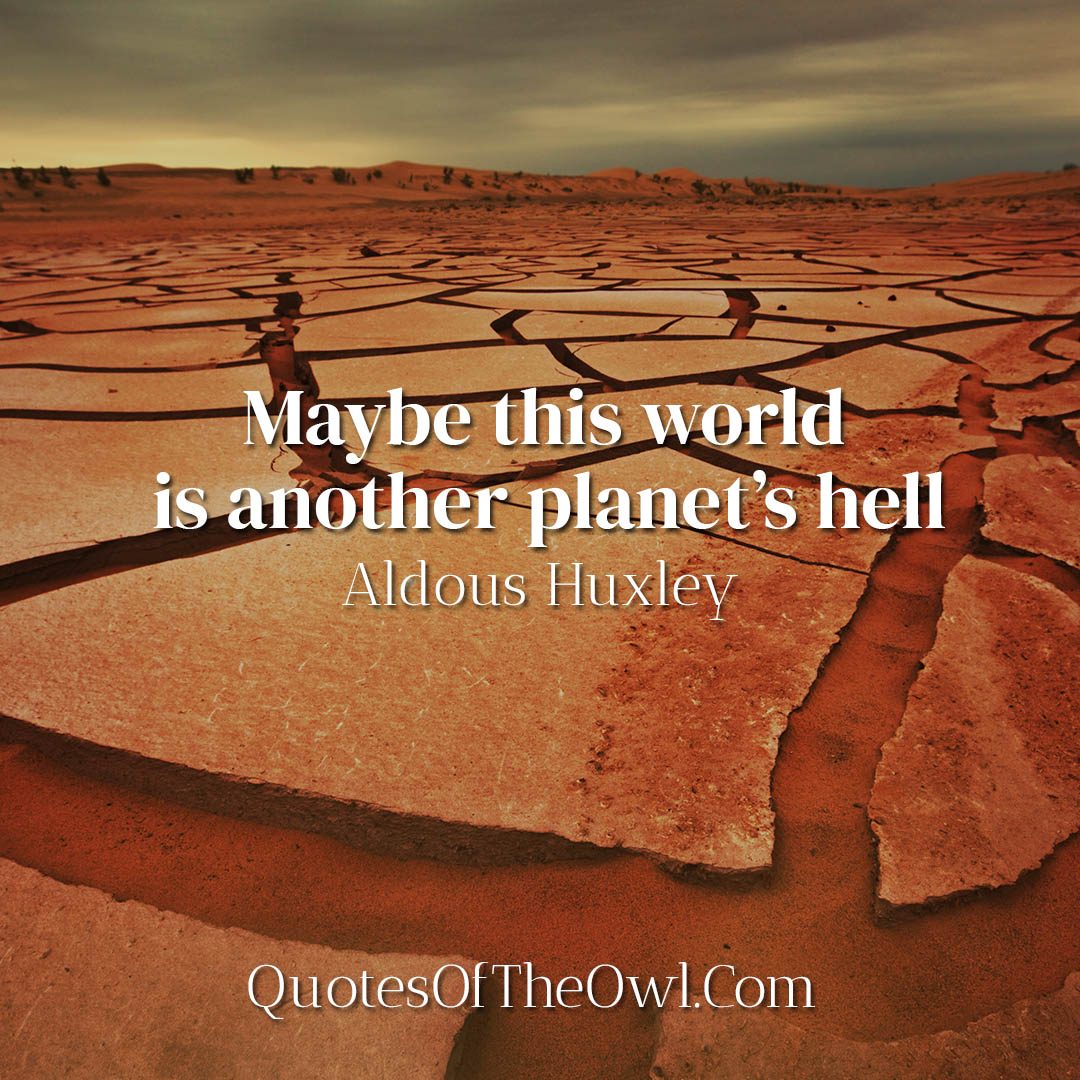Aldous Huxley: “Maybe this world is another planet’s hell” – Quote Meaning
Aldous Huxley, a renowned English writer and philosopher, once pondered upon a thought-provoking statement that has echoed through time: “Maybe this world is another planet’s hell.” Born in 1894, Aldous Huxley was a visionary intellectual who delved into various genres, including novels, essays, and philosophical works. He is best known for his dystopian novel “Brave New World,” which depicted a futuristic society controlled by technological advancements and societal conditioning. Huxley’s writings often explored the human condition, the search for truth, and the dark side of human nature.
The Quote: “Maybe this world is another planet’s hell”
Exploring the context
When Huxley uttered the thought-provoking words, “Maybe this world is another planet’s hell,” he invited readers and thinkers to ponder the nature of existence and the human experience. This profound statement raises questions about the meaning of suffering, the purpose of life, and the potential realms beyond our comprehension.
Huxley’s perspective on the quote
In the context of Huxley’s works, this quote reflects his skepticism towards societal norms, the limitations of human perception, and the possibility of alternate realities. Huxley was known for challenging the status quo and advocating for individual freedom and intellectual exploration. He often expressed concerns about the dehumanizing effects of industrialization and mass consumerism.
Interpreting the quote
Reflection on human suffering
The quote suggests that the world we inhabit might be an embodiment of suffering and turmoil. It raises the question of whether the human experience is inherently marked by anguish and hardship. Huxley’s viewpoint implies that life on Earth may be a form of purgatory, where individuals grapple with pain and adversity.
The concept of hell
Huxley’s reference to “another planet’s hell” draws upon the concept of hell as a place of punishment and torment. It metaphorically presents Earth as a realm where humanity faces its own consequences and struggles. The quote invites contemplation on the existence of suffering, its origins, and its potential purpose in shaping human consciousness.
A critique of society and human nature
Huxley’s quote can be interpreted as a critique of society’s shortcomings and the darker aspects of human nature. It suggests that the world we inhabit may be a manifestation of humanity’s collective failings, where greed, power, and ignorance prevail. By alluding to the notion of hell, Huxley challenges readers to reflect on the societal structures and human behaviors that perpetuate suffering.
Huxley’s philosophical views
Brave New World and dystopian themes
Huxley’s novel “Brave New World” offers a glimpse into a dystopian society governed by conformity, pleasure, and control. Through this work, Huxley expressed concerns about the dehumanizing effects of technological progress and the loss of individuality. His philosophical views often centered around the dangers of sacrificing personal freedom and critical thinking for the sake of societal stability.
The search for meaning and truth
Huxley was deeply engaged in philosophical and spiritual pursuits throughout his life. He explored various Eastern and Western philosophies, delving into the realms of mysticism and consciousness expansion. Huxley’s quest for meaning and truth is reflected in his writings, including the quote in question. It hints at his belief that there might be realities beyond our perception, waiting to be unveiled.
The relevance of the quote today
Environmental concerns and ecological crisis
In the context of today’s world, Huxley’s quote takes on added significance. As humanity grapples with environmental degradation, climate change, and ecological imbalances, the idea of our planet being akin to a hellish realm becomes more pertinent. It highlights the consequences of our actions and the urgent need for collective responsibility in preserving the Earth for future generations.
Societal issues and human suffering
Moreover, the quote prompts reflection on the myriad societal issues that plague humanity. Inequities, conflicts, and social injustices raise questions about the nature of our world and the reasons behind human suffering. Huxley’s words encourage us to examine the systems and structures that contribute to the perpetuation of suffering and to seek transformative solutions.
Conclusion
Aldous Huxley’s quote, “Maybe this world is another planet’s hell,” challenges us to contemplate the nature of our existence, the presence of suffering, and the underlying dynamics that shape our reality. It invites us to question societal norms, explore philosophical inquiries, and strive for a deeper understanding of the human experience. In a world fraught with challenges, this quote serves as a poignant reminder to reassess our values, address our shortcomings, and work towards creating a more compassionate and harmonious planet.
Explore the wisdom of Aldous Huxley through his thought-provoking quotes

